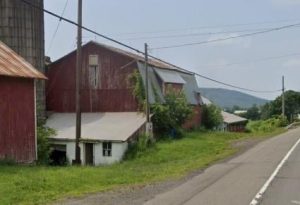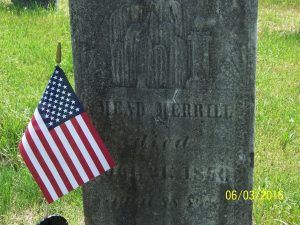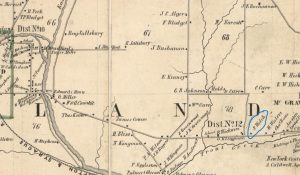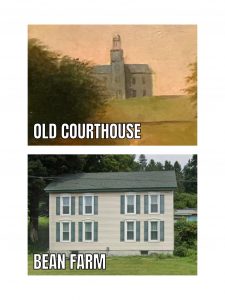Since October of 1850, within the old stone walls of the peaceful Conable Cemetery, a soldier of the American Revolution lies at rest on land that was once his. Mead Merrill was born on August 22, 1762, in Goshen, Litchfield County, Connecticut, to David Merrill and Esther Howe. Little is known about Mead Merrill’s life before he came to Cortland County, however, we do know that he enlisted on February 2, 1777, in the 6th regiment of the Connecticut Line and served for four years. He was 14 years old at the time of his enlistment. He later married Anne Hotchkiss, and by 1794, they had moved from Connecticut to New York, and a son was born to them that year. It’s possible that they settled first in Onondaga County before moving on to Cortland County. Eight children are recorded for Mead and Anne: Rachel, Abel, Orra, Alva, Riley, Hiram, Rensselaer, and Anne.
Mead Merrill’s name is sprinkled throughout the text of “History of Cortland County” (H.P. Smith), and many details of his life in this county are written within the pages. He and his family came to Cortland by at least 1801 according to “Grip’s Historical Souvenir of Cortland.” In the McGraw section of this publication, the contributor B.T. Burlingham tells us that Mead Merrill settled on his portion of the military tract (Lot 78) in 1801 and “built a house where F.C. Welch’s residence now stands.” “Grip’s” was published in 1899, and the F.C. Welch residence eventually became the Bean farm just outside of McGraw. In 1806, Mead Merrill built a gambrel roof barn that became known as a landmark all over the state. It was on one of the first roads in Cortland County and was used as a landmark for travelers, but more interestingly, a total eclipse of the sun occurred during the roofing of this barn (June 16, 1806), and workers had to suspend their activities for more than two hours!
The case for the house being the same one built by Mead Merrill has some strength because Merrill was one of three men assigned to a committee to build a courthouse in Cortland in 1812, and the charge was to build the “water-tables, corner boards, cornices, front door and sidelights similar to Mead Merrill’s new dwelling house.” When you look at the painting of the “Old Courthouse on the Hill” which is on exhibit at Cortland County Historical Society, the courthouse design is similar to the house which still stands at the location of the Merrill/Welch/Bean residence. After more than 200 years, it is not an exact match, but is this house the very one built in 1801 by Mead Merrill? It is uncertain if the same residence which stands in the location of the Welch, then Bean farm is the same building erected by Mead Merrill, or if the barn on the opposite side of the road could be the same one built in 1806. More extensive research is needed, and if you have any information to help solve the mystery, please let us know! We do know that the barn that sits on the same side as the house and up the bank was built by the Bean family.
In addition to leaving us a little mystery, Mead Merrill was quite involved in community life in early Cortland County. He served in the capacity of a surrogate judge, the town of Homer supervisor, and the county clerk, and he was appointed to a board of health formed to prevent a cholera epidemic from spreading to Cortland County. Merrill built a sawmill at Port Watson and owned other property throughout the county. He built another house sometime between 1816 and 1820, but it is unknown if he moved there from the early home outside of McGraw.
Merrill was elected a trustee when the Universalist Society was formed in 1813, and through his influence and financial contributions, he ensured the building of the Cobblestone Church. He was instrumental in getting the basement of the church used as a town hall for Cortlandville. In politics, he was a Federalist, and he found himself embroiled in a slander suit against John Miller when he accused Miller of stealing. A high-profile trial was held with celebrated attorneys of the day representing both parties. In the end, the jury rendered a verdict for Miller.
As a soldier of the American Revolution, Mead Merrill deserves to have a little recognition for his contributions to the formation of the United States, and his civilian life brought him to Cortland County where his contributions here helped form the place we know today. Thank you for your service, Mr. Merrill. ~Tabitha Scoville, CCHS Director





